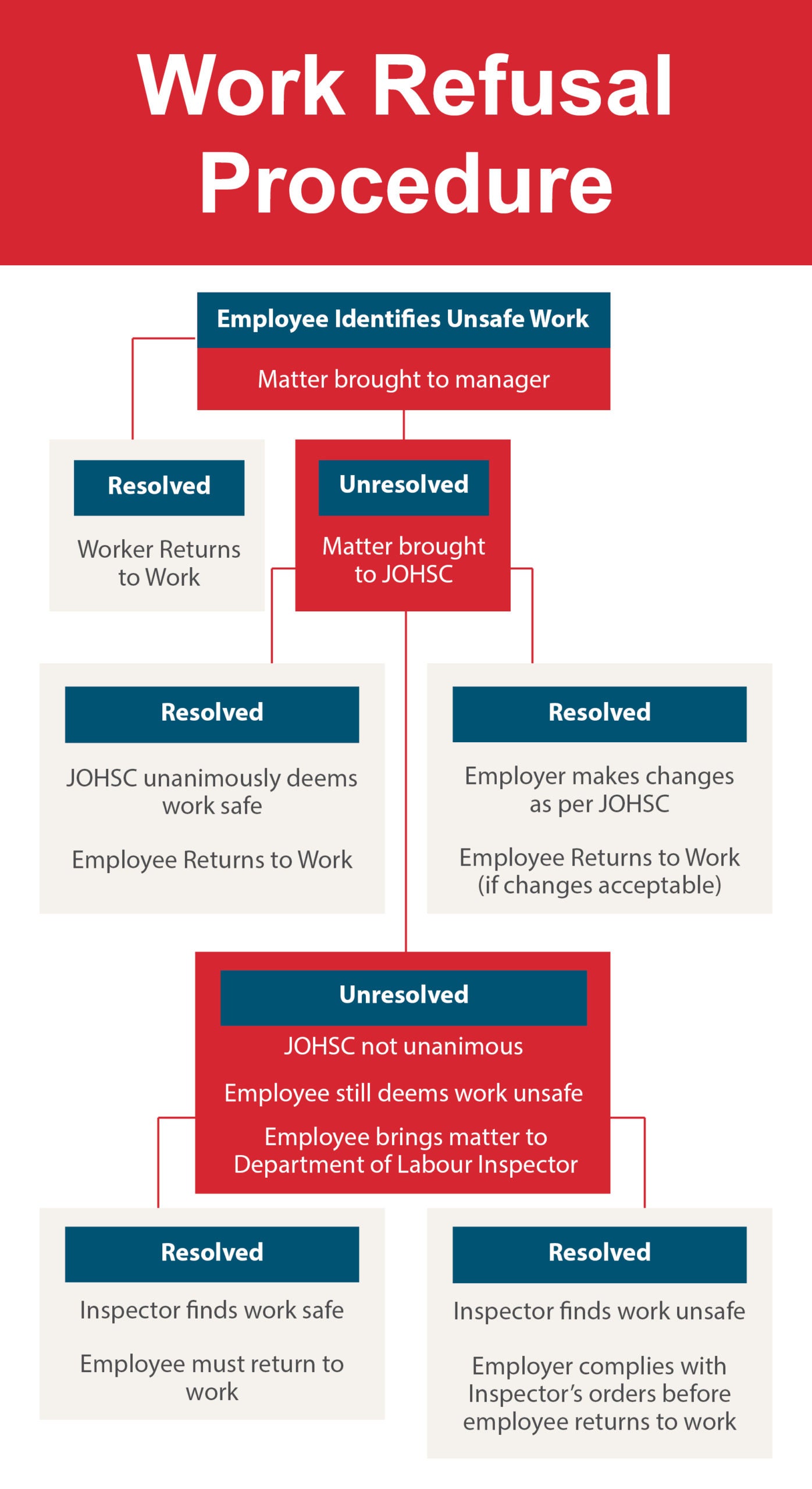As an employee in Nova Scotia, you have the right to refuse work that you honestly believe to be unsafe (i.e., likely to endanger your health or safety or the health or safety of others). The employer cannot deduct your pay, discipline or punish you, or otherwise discriminate against you for exercising your right to refuse unsafe work.
The rights and protections relating to work refusal are set out in sections 43-46 of the Occupational Health and Safety Act.
- You are entitled to refuse work if you have reasonable grounds (i.e., an honest belief) that the work is likely to endanger your health or safety or the health or safety of others.
- The right to refuse work applies only to health and safety issues.
- You may refuse work if you honestly believe that your workplace does not offer adequate protection against exposure to COVID-19.
The Occupational Health and Safety Act prescribes a three-step process for exercising your right to refuse unsafe work. These steps are explained below.

Step 1: Report to Supervisor
- Contact your supervisor and report that you are exercising your right to refuse unsafe work under section 43 of the Occupational Health and Safety Act.
- Put your report into writing and keep a copy for your records.
- Keep your report as short and clear as possible.
- Your supervisor should investigate, respond, and provide a solution so you can go back to work safely.
Step 2: Report to the Joint Occupational Health and Safety Committee
- If your supervisor is unable or unwilling to remedy the situation to your satisfaction, report to the Joint Occupational Health and Safety Committee (“JOHSC”) that you are maintaining your work refusal under section 43 of the Occupational Health and Safety Act.
- Put your report into writing and keep a copy for your records.
- Keep your report as short and clear as possible.
- The JOHSC should investigate the situation you reported, and make recommendations to the employer to try to fix it so you can go back to work safely.
- Unless the JOHSC unanimously advises you to return to work, you are entitled to maintain your work refusal, and move on to Step 3.
Step 3: Report to the Department of Labour
- If the JOHSC is unable to remedy the situation to your satisfaction, report to the Department of Labour that you are maintaining your work refusal under section 43 of the Occupational Health and Safety Act.
- Contact the Department of Labour in writing (email or fax) and keep a copy for your records.
- Inform the Department of Labour that you have previously reported the work refusal to your supervisor and the workplace JOHSC.
- Keep your report as short and clear as possible.
- The Department of Labour will investigate the situation. After investigation, they will either order the employer to make changes to ensure that your work is safe or tell you that the work is safe.
- If the Department of Labour tells you the work is safe, you must return to work, even if you disagree.
Your Rights During a Work Refusal
Once you began Step 1 and until you have completed Step 3:
- the employer cannot force you to do the work that you have refused;
- the employer is allowed to assign you different work;
- the employer is legally required to pay you your normal wages regardless of whether you are assigned different work;
- the employer can assign the work you refused to someone else, but must inform that employee that someone refused the work because they believed it to be unsafe; and
- the employer is prohibited from disciplining or punishing you or taking any other discriminatory action against you.
If you feel your employer is not respecting your rights, document everything, and contact your CUPE 3912 Vice President (VP).
Further Reviews and Appeals
The Department of Labour’s decision is subject to further reviews and appeals (e.g., under sections 67-69 Occupational Health and Safety Act); however, those procedures are beyond the scope of this guide.
Additional Resources
- How to Refuse Unsafe Work, by the Office of the Worker Counsellor.
- Right to Refuse, by NSNU (Nova Scotia Nurses Union)
- COVID-19 and the right to refuse unsafe work, CUPE National
- Province of Nova Scotia